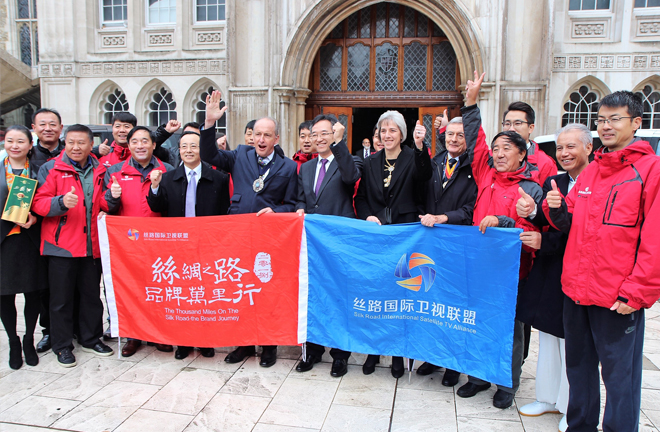UK scholar speaks on Belt and Road

A group of vehicles from the ancient Chinese city of Xi’an arrives in the City of London last November, after a journey of 65 days and more than 5,000 miles across the ancient Silk Road, to mark the 5th anniversary of the Belt and Road initiative. To celebrate their arrival, a ceremony was organized in the Guildhall Yard. Photo: CITY OF LONDON
LONDON—In April this year, the second Belt and Road Forum for International Cooperation is scheduled to take place in Beijing.
Kerry Brown, a professor of Chinese Studies and director of the Lau China Institute at King’s College, London, spoke with CSST on the Belt and Road (B&R) initiative.
The B&R is a long-term sustainable initiative and needs to be deepened through the implementation of specific projects, Brown said. For example, China’s railway network extends in all directions, and the operating mileage of its high-speed railway has reached tens of thousands of kilometers. China has superb technology and rich experience in building such infrastructure as high-speed rail. Strengthening the cooperation between China and the EU in this regard can help Europe deepen its understanding of the B&R initiative.
As the world’s second largest economy, China needs to have a voice on the international stage. The B&R indicates China’s take on major-country diplomacy. The B&R’s importance lies not only in facilitating economic cooperation, but also in enhancing the world’s understanding of China, Brown said. Through the B&R initiative, more countries have re-examined China’s international influence on the world economy, politics and culture. The B&R initiative has enhanced the exchanges and mutual learning between China and the West, providing new opportunities for the parties involved to change and develop together.
Think tanks in China and other countries are carrying out joint research on the B&R. At present, think tanks in other countries still conduct relatively few studies in the areas of the maritime Silk Road and regional security. The research of European and American think tanks is mainly concentrated in the field of the B&R’s economic influence, Brown observed. With the implementation of more projects under the initiative, the period of large-scale research on the B&R by think tanks around the world is about to come.
China has affected the world not only in the economic field, but also in the fields of politics and culture. However, Western countries including the United Kingdom still have yet to fully understand China’s culture, language and development strategies, Brown noted. How to spread China’s ideas and culture and make Western people understand them is a current challenge. For example, a community of shared future for mankind reflects inclusiveness and diversity. China has a value system based on its own cultural history. Europe has different value systems. How to seek common ground while preserving differences is the challenge facing the building of a community of shared future for mankind.
Since the reform and opening up, China has been deeply involved in globalization. How to continue to promote economic growth and technological development and how to encourage innovation and optimize education are all specific areas of practice. For China to become a knowledge superpower, it requires more exchanges and cooperation.
UK-China cooperation will be closer after Brexit, Brown noted. China is cautious in the field of foreign investment. Through two-way investment, British and Chinese companies can establish strategic partnerships. The service industry is one of the pillar industries of the British economy. The service industry in China has also entered a period of rapid growth. The service enterprises in the UK can enter the Chinese market and provide financial and insurance services.
Brown expressed his hope that Britain can reach a free trade agreement with China after Brexit, so that more British companies can enter the Chinese market and Chinese companies will have more development opportunities in the UK.
edited by JIANG HONG
